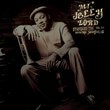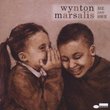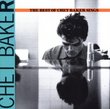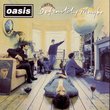| All Artists: Wynton Marsalis Title: Unforgivable Blackness: The Rise and Fall of Jack Johnson (Score) Members Wishing: 0 Total Copies: 0 Label: Blue Note Records Original Release Date: 1/17/2005 Re-Release Date: 11/30/2004 Album Type: Soundtrack Genres: Jazz, Pop, Soundtracks Styles: Modern Postbebop, New Orleans Jazz, Traditional Jazz & Ragtime, Bebop Number of Discs: 1 SwapaCD Credits: 1 UPC: 724386419422 |
Search - Wynton Marsalis :: Unforgivable Blackness: The Rise and Fall of Jack Johnson (Score)
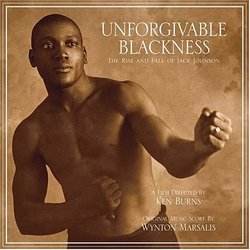 | Wynton Marsalis Unforgivable Blackness: The Rise and Fall of Jack Johnson (Score) Genres: Jazz, Pop, Soundtracks
The legendary Jack Johnson, the first African-American heavyweight champion, is the subject of Ken Burns's 2005 PBS documentary, and Wynton Marsalis (a major figure in the filmmaker's 2000 miniseries, Ken Burns's Jazz) tur... more » |
Larger Image |
CD DetailsSynopsis
Amazon.com The legendary Jack Johnson, the first African-American heavyweight champion, is the subject of Ken Burns's 2005 PBS documentary, and Wynton Marsalis (a major figure in the filmmaker's 2000 miniseries, Ken Burns's Jazz) turns in a brilliant original score that captures the courage, chaos, and controversy of Johnson's racially charged feats and exploits. Compositions by Jelly Roll Morton and W.C. Handy augment the leader's quasi-Ellingtonian ragtime, blues, dirges, ballads, and stride selections. Also included are four previously released tracks, two from Mr. Jelly Lord and two from Reeltime, the Marsalis score made for (but ultimately not used in) the movie Rosewood. Of course, Marsalis is on his best trumpet behavior, and he shows a real and unacknowledged talent for writing in this idiom. --Eugene Holley, Jr. Similar CDs
Similarly Requested CDs
|
CD ReviewsMostly a KNOCKOUT! Eduardo Nietzsche | Houston | 03/25/2007 (4 out of 5 stars) "A few of the tracks are kind of difficult to really get into, but there's plenty of rich juicy stuff here, particularly the last track "We'll Meet Again Someday." Marsalis has composed a score that justly deserves to be joined with this truly amazing documentary on a truly amazing man and boxer." It is good.......again Arthur E. Kyle | Albany, OR USA | 02/25/2005 (4 out of 5 stars) "This is fun music that takes you back in time. Back to..oh..the 1999 release "Reeltime". The soundtrack Wynton wrote for the movie "Rosewood" that was not used. Play track #1 on both albums "Rosewood" on "Reeltime" and "What Have You Done" on "Unforgivable Blackness"...notice a similarity. Try "Rattlesnake Tail Swing" on "Reeltime" and..um.."Rattlesnake Tail Swing" on "Unforgivable Blackness". By now I'm sure you get the point. The music is certainly given a different treatment on both albums but that doesn't change the fact that this music is not original to this soundtrack. I guess it has gotten to the point that Wynton and "his" are now repeating themselves. Noticeably missing from the liner notes are Stanley Crouch and his pontifications (which I actually enjoy), I guess he must have felt that he said it all the first time with "Reeltime". Musically this a very good album but I liked "Reeltime" better. What the hell be a fool and buy both...God knows I did." Wynton in his element a consumer | 07/13/2005 (3 out of 5 stars) "Wynton is a very talented musician whose ambitions lie primarily with social rather than musical issues. He wants to get jazz through the door of the big cultural institutions of America, like Lincoln Center, schools, museums, etc., to put jazz on an equal social footing with, I guess, "classical" music. That all commendable, but it seems that he and his buddies Crouch and Murray think the way to do this is to turn jazz into stone--develop a rigid, fixed notion of what it's supposed to be, the better to promote it for its "greatness" and "timelessness". They're promoting a marble statue called "jazz", and while this is fine it's part of a culture war and not a living art.
Wynton is really a music educator and curator. He's not a person who will advance the art, despite his musical talent. This soundtrack is perfect for him, since he decided some years back that he was going to try to revive Dixieland. It provides the appropriate predictable "period" color that Ken Burns is so fond of (during his "Civil War" film that lonesome-harmonica-by-the-campfire just never quit), but how could you listen to this as music? I fully agree with a previous reviewer, the Miles Davis "Jack Johnson" soundtrack is a lot better, because it wasn't trying to be a period costume drama. It's kind of funny, Wynton has spent his entire career trashing Miles, it seems like this is a bit of a symbolic attempt by him to slay the father figure, but all he's created is some mildly interesting background music. Miles' "Jack Johnson" is still the champion!" |

 Track Listings (21) - Disc #1
Track Listings (21) - Disc #1